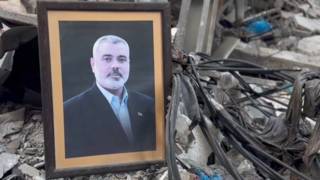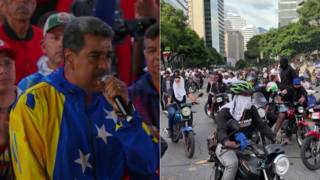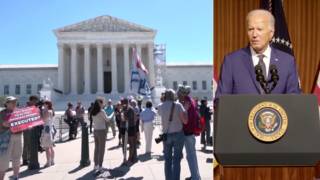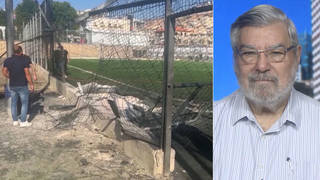This content originally appeared on Democracy Now! and was authored by Democracy Now!.
This post was originally published on Radio Free.
This content originally appeared on Democracy Now! and was authored by Democracy Now!.
This post was originally published on Radio Free.
This content originally appeared on Democracy Now! and was authored by Democracy Now!.
This post was originally published on Radio Free.
This content originally appeared on Democracy Now! and was authored by Democracy Now!.
This post was originally published on Radio Free.

We speak with legal scholar Kimberlé Crenshaw about the historic presidential campaign of Vice President Kamala Harris, who is facing a slew of racist and misogynist attacks from Donald Trump and others as she runs to be the first woman and the first woman of color to occupy the White House. Crenshaw, who coined the term “intersectionality,” says Harris’s candidacy is leading to backlash from those who fear the emergence of a more diverse country. “The challenge is, quite clearly, that those who support Kamala Harris and those who support our democracy have to take back the ground that they have ceded in the war on woke,” says Crenshaw, executive director of the African American Policy Forum, which is hosting its annual Critical Race Theory Summer School in Nashville this week.
This content originally appeared on Democracy Now! and was authored by Democracy Now!.
This post was originally published on Radio Free.

Fears of all-out war in the Middle East are growing after top Hamas political leader Ismail Haniyeh was assassinated in Tehran on Wednesday. Haniyeh was in Iran for the inauguration of the country’s new president. Iran and Hamas both blamed Israel, which has not officially claimed responsibility but had previously vowed to kill Haniyeh and other top Hamas leaders over the October 7 attack. The assassination came less than 24 hours after Israel took credit for killing Fuad Shukr, a senior Hezbollah commander, in an airstrike on Beirut. For more on the significance of the assassination, we host a roundtable discussion with Haaretz columnist Gideon Levy in Tel Aviv; international politics professor Karim Makdisi, who teaches at American University of Beirut; and Palestinian American journalist Rami Khouri in Boston. “Killing Haniyeh really is a sign from the Israelis that they are not interested in negotiating the ceasefire, the hostage release, prisoner exchanges. They just want to assert Zionist Jewish supremacy in all of Palestine and control the powers around the region,” says Khouri.
This content originally appeared on Democracy Now! and was authored by Democracy Now!.
This post was originally published on Radio Free.
Democracy Now! Wednesday, July 31, 2024
This content originally appeared on Democracy Now! Audio and was authored by Democracy Now!.
This post was originally published on Radio Free.
This content originally appeared on Democracy Now! and was authored by Democracy Now!.
This post was originally published on Radio Free.
This content originally appeared on Democracy Now! for Broadcasters – HD MP4 and was authored by Democracy Now! for Broadcasters – HD MP4.
This post was originally published on Radio Free.
This content originally appeared on Democracy Now! and was authored by Democracy Now!.
This post was originally published on Radio Free.
This content originally appeared on Democracy Now! and was authored by Democracy Now!.
This post was originally published on Radio Free.
This content originally appeared on Democracy Now! and was authored by Democracy Now!.
This post was originally published on Radio Free.
This content originally appeared on Democracy Now! and was authored by Democracy Now!.
This post was originally published on Radio Free.
This content originally appeared on Democracy Now! and was authored by Democracy Now!.
This post was originally published on Radio Free.

Protests erupted on Monday in Venezuela after sitting President Nicolás Maduro was declared the winner of Sunday’s presidential election despite the opposition’s accusations of election fraud. Maduro has countered by accusing the opposition of attempting to stage a fascist coup. We go to Caracas for an update from Venezuelanalysis reporter Andreína Chávez, who says the opposition’s claims are still unsubstantiated. We also hear from Venezuelan historian Alejandro Velasco, who lays out how Venezuela’s economic crisis, fueled in part by U.S. sanctions, has generated rising social upheaval.
This content originally appeared on Democracy Now! and was authored by Democracy Now!.
This post was originally published on Radio Free.

New details have emerged about Republican vice-presidential nominee JD Vance’s past comments that continue to plague the Trump campaign, with the Ohio senator having made repeated remarks over the years denigrating people without children as “cat ladies” and “sociopaths.” We speak with ProPublica reporter Andy Kroll, who has reported on Vance and says he is “demonizing huge swaths of Americans” and embodies a “really extreme version of conservative politics.”
This content originally appeared on Democracy Now! and was authored by Democracy Now!.
This post was originally published on Radio Free.

Republican presidential nominee Donald Trump made headlines this week after suggesting the 2024 election could be the last U.S. election if he wins in November. We look at a secret organization of wealthy Christians called Ziklag that is backing Trump’s efforts by working to purge more than a million voters from the rolls in battleground states and mobilize Republican voters to back Trump. The news outlets ProPublica and Documented obtained thousands of Ziklag’s internal files and found the group has divided its 2024 activities into three different operations: Steeplechase, which uses churches to get out the vote; Watchtower, which aims to rally voters around opposition to transgender rights; and Checkmate, which is focused on funding so-called election integrity groups, explains ProPublica investigative reporter Andy Kroll.
This content originally appeared on Democracy Now! and was authored by Democracy Now!.
This post was originally published on Radio Free.

Just a month after the Supreme Court granted former President Donald Trump broad immunity from prosecution for crimes committed in office, President Joe Biden has laid out a plan to reform the court. On Monday, Biden called for 18-year term limits, an enforceable code of ethics and an end to presidential immunity, though he stopped short of supporting court expansion. “This is a pretty big deal,” says Jennifer Ahearn, senior counsel in the Brennan Center’s Judiciary Program, though she notes that “politically, we have a ways to go before the views of the people … can actually make their way through the Washington process.” Ahearn explains the potential effects of judicial term limits, which could bring the court closer in line with “the issues of the day,” better reflecting the results of recent presidential elections than the current system of lifetime appointments does. Biden’s proposal was buoyed by Justice Elena Kagan’s public comments last week endorsing an enforceable code of ethics. This shows just “how much the conversation around Supreme Court reform has changed” as a result of the court’s current ethics scandal, adds ProPublica reporter Andy Kroll, who was part of a Pulitzer Prize-winning team that exposed how Justice Thomas accepted unreported gifts from conservative megadonors who had business before the court.
This content originally appeared on Democracy Now! and was authored by Democracy Now!.
This post was originally published on Radio Free.
Democracy Now! Tuesday, July 30, 2024
This content originally appeared on Democracy Now! Audio and was authored by Democracy Now!.
This post was originally published on Radio Free.
This content originally appeared on Democracy Now! and was authored by Democracy Now!.
This post was originally published on Radio Free.
This content originally appeared on Democracy Now! for Broadcasters – HD MP4 and was authored by Democracy Now! for Broadcasters – HD MP4.
This post was originally published on Radio Free.
This content originally appeared on Democracy Now! and was authored by Democracy Now!.
This post was originally published on Radio Free.
This content originally appeared on Democracy Now! and was authored by Democracy Now!.
This post was originally published on Radio Free.
This content originally appeared on Democracy Now! and was authored by Democracy Now!.
This post was originally published on Radio Free.

Israel has vowed to retaliate against Hezbollah after blaming the Lebanese group for a rocket attack Sunday in the Israeli-occupied Golan Heights in Syria that killed 12 children at a soccer field. Hezbollah has denied responsibility for the attack in the village of Majdal Shams, home to members of the Druze community, an Arab-speaking minority group. Israel claimed the victims were Israeli citizens, though many Druze in the area do not have Israeli citizenship and are in fact Syrian citizens. The deadly attack has further stoked fear of a wider regional war. Palestinian American journalist Rami Khouri says that while the rocket attack looks as though it could have been an accident, there is still risk of more violence. “The danger is always there that an accident could spark a bigger confrontation,” he says. “Militarism isn’t a solution. Militarism is part of the problem.”
This content originally appeared on Democracy Now! and was authored by Democracy Now!.
This post was originally published on Radio Free.

We speak with Politico reporter Ian Ward about JD Vance, who has become a lightning rod for controversy since being picked by former President Donald Trump to be his running mate. Ward spent months with Vance earlier this year for a profile about the freshman Ohio senator and his political evolution from a “Never Trump” Republican to one of the MAGA movement’s most prominent voices. He recently wrote a new piece about Vance headlined “The Seven Thinkers and Groups That Have Shaped JD Vance’s Unusual Worldview.”
This content originally appeared on Democracy Now! and was authored by Democracy Now!.
This post was originally published on Radio Free.

We speak with reproductive justice activist Renee Bracey Sherman about Ohio Senator JD Vance, whose history of sexist remarks has come under scrutiny since he was chosen to be Donald Trump’s running mate in the 2024 presidential election. Bracey Sherman says Vance’s attacks on women who do not have biological children and his promotion of a kind of “trad” lifestyle harkening back to 1950s norms show he is out of touch with modern families. “The short answer is he’s a weirdo. The longer answer is he’s a white supremacist and he’s a white nationalist,” Bracey Sherman says in explaining Vance’s ideology.
This content originally appeared on Democracy Now! and was authored by Democracy Now!.
This post was originally published on Radio Free.

Republican vice-presidential nominee Ohio Senator JD Vance has doubled down on his sexist remarks that Democrats are led by “childless cat ladies,” claiming the party is anti-family. He made the original comment on Tucker Carlson’s Fox News show in 2021. He has also previously suggested parents should be given more votes than childless people. “I just find the entire line of attack to be ridiculous and also unpopular,” says New York Times opinion writer Jessica Grose, who notes that Republicans generally also oppose paid leave, universal child care and other policies that make it easier to have families. “There’s still this idea that if you are a woman, unless you bear children, you are somehow less than.”
This content originally appeared on Democracy Now! and was authored by Democracy Now!.
This post was originally published on Radio Free.
Headlines for July 29, 2024; JD Vance Calls Democrats “Childless Cat Ladies”; GOP Opposes Paid Leave, Universal Child Care; “He’s a Weirdo”: Repro Rights Activist on JD Vance’s History of Sexism & White Nationalism; Politico’s Ian Ward on the Thinkers and Groups Who Have Shaped JD Vance’s Unusual Worldview; “Militarism Isn’t a Solution”: Rami Khouri on Rocket Attack in Golan Heights, Israeli Vow of Revenge
This content originally appeared on Democracy Now! Audio and was authored by Democracy Now!.
This post was originally published on Radio Free.
This content originally appeared on Democracy Now! and was authored by Democracy Now!.
This post was originally published on Radio Free.
This content originally appeared on Democracy Now! for Broadcasters – HD MP4 and was authored by Democracy Now! for Broadcasters – HD MP4.
This post was originally published on Radio Free.